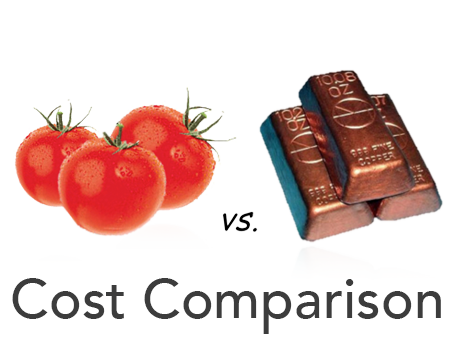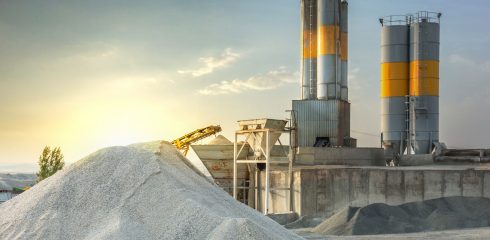
Take a few moments to look around you and subtract all the objects and energy sources that aren’t grown and you soon get an impression of what life would be like without mining (you should be seeing something resembling Gilligan’s Island by now-if not watch this short video).
Now think about all the jobs associated with manufacturing, distributing and supporting these objects and you start to appreciate what a big impact mining has on modern society. Smartphones alone contain 62 different mined materials and to maintain today’s lifestyle every American baby will need 3.11 million pounds of minerals, metals and fuels in their lifetime.
Most mining and minerals processing operations are really bulk solids handling systems (accounting for 30-60% of the processing cost) with transformation (upgrading) steps in between. To illustrate this and get some idea of scale of things, lets consider just one important metal; Copper.
Our average lifetime requirement of 985 lbm of new copper metal requires 3,940 lbm of mineral concentrate derived from 98,000 lbm of ore separated from 245,500 lbm of mined rock (ore & waste). That’s a lot of bulk material to be moved (& often long distances), and that is just for one person and one metal!
So…to the purpose of this blog-Why is the science of bulk solids handling important to mining? The 2 primary reasons are Cost and Safety.
Cost: The current LME price for copper is US$2.18 /lbm, which includes the mining, handling, compliance and multiple transformational steps, is less than the price of tomatoes ($2.55/lbm)!! Given the massive differences in the “journeys” between a lbm of copper and a lbm of tomatoes, how is this even remotely possible?

And it’s not just copper either. In fact on a pound-for-pound basis:
- Aluminum metal is cheaper than bananas,
- Zinc metal is around the same price as potatoes,
- Steel billet, with all its energy intense processing, is the same price as a large egg!
The reason to these relatively low prices is the economies of scale for which the mining industry is famous. For example the Kennecott Utah Copper mine moves 50,000,000 lbm. of rock (ore & waste) every hour of every day.
Large mines, large trucks, large furnaces-large everything’s, but without an efficient way to transfer the bulk solids from and through one-step to the other, the price of the metal product would be significantly higher, making everything incorporating them much more expensive. The application of bulk solids science therefore facilitates the economies of scale that keep the prices of metal low, and we all enjoy the benefit everyday.
Safety: Continuous movement of large volumes of bulk solids at high speed not only involves large and powerful machines, it also encompasses high energy hence danger. Todays mining industry is very safety conscious and effective management of these dangers requires recognition of the hazards associated with bulk solids handling together with an appreciation of the design options and engineering controls available.
Other common OH&S issues that benefit for bulk solids science include dust control, maintenance access and transportable moisture limits.
From our time in the kitchen (or beach/sand-pit) most of us know the flow behaviour of bulk solids is very different to that of fluids. When it comes to bulk solids, it’s all about friction, which in turn depends on the size, shape and surface properties of the particles involved and the surfaces they contact.
An interesting thing about mining is that every particle involved, from boulder to dust spec, is physically unique.

As a result every contact between particles or with a surface is also unique in terms of frictional forces, making predicting behaviour a complex task business.
Thanks to Dr. Andrew Jenike (our founder) there is now a solid science involved however knowing where and how to apply it still requires experience. Since establishment 50 years ago, we have tested +13,000 different materials (including most mined materials) and completed +7,500 projects accumulating over 650 person-years of experience in the bulk solids field. We have representatives on most key industry bodies and a proud reputation as industry leaders, leveraging the underpinning science to provide our customers with a range of services together with complete solutions that give them total peace of mind.
Misbehaving bulk solids systems are one of biggest root causes of loss (financial and OHS) and therefore opportunity in mining operations and through the application of Dr Jenike’s science the mining industry continues to improve so we can all continue to enjoy the items it produces.
As an aside, if you are looking for an engaging and future proof career, where you will be intellectually challenged every single day and where your creative solutions will make a strong positive impact on society, bulk solids science is highly recommended!





